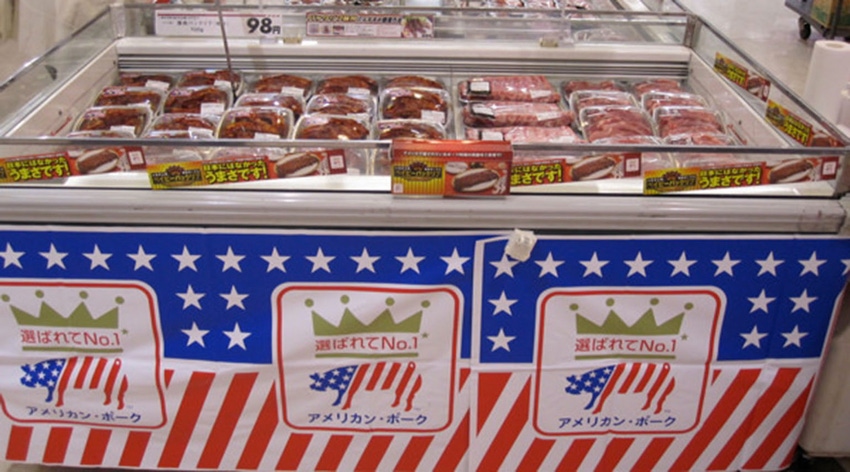Legislative Watch: TPP proceeds without the U.S.; USDA reorganization continues; ag exports hit $140 billion; coalition asks for more research funding; FSA committee elections under way.

Representatives from the 11 remaining Trans-Pacific Partnership countries (Australia, Brunei, Canada, Chile, Japan, Malaysia, Mexico, New Zealand, Peru, Singapore and Vietnam) last Saturday announced they had reached an agreement to move forward with negotiations on TPP.
The agreement will now be called the Comprehensive and Progressive Agreement for Trans-Pacific Partnership. The countries have agreed on the core elements for a new framework and expect to finalize the agreement early next year. Each member state will be required to ratify and sign the agreement before it can be implemented. The 11 countries represent a sixth of global trade.
Once the new trade agreement is finalized, member countries will enjoy lower tariff trade with one another. The CPTPP will sharply cut agricultural tariffs for the 11 country members. Also, Korea, the Philippines and Thailand are expected to join the new trade agreement once it is ratified. Thus U.S. companies and industries will find themselves at a disadvantage. U.S. agriculture is expected to lose sales and market share once the agreement goes into effect.
President Trump pulled out of TPP in January.
Ag exports hit $140.5 billion in FY ’17
U.S. agricultural exports totaled $140.5 billion for fiscal year 2017, an increase of $10.9 billion over fiscal year ’16. This is the third-highest level on record. The fiscal year ’17 agricultural trade surplus was $21.3 billion, an increase of $16.6 billion.
The top 10 exports markets for U.S. agriculture were China at $22 billion, Canada at $20.4 billion, Mexico at $18.6 billion, Japan at $11.8 billion, European Union at $11.6 billion, South Korea at $6.9 billion, Hong Kong at $4 billion, Taiwan at $3.4 billion, Indonesia at $3 billion and the Philippines at $2.6 billion. Two of the fastest growing markets were Mexico at 6% and Japan at 12%.
According to the USDA, “U.S. bulk commodity exports set a volume record at 159 million metric tons, up 11% from fiscal year 2016, while their value rose 16% to $51.4 billion. The surge was led by soybean exports, which reached a record 60 million metric tons, valued at $24 billion. Exports of corn, wheat and cotton all grew as well, with the value of cotton exports climbing 70%, to $5.9 billion, wheat exports up 21%, to $6.2 billion, and corn exports up 6%, to $9.7 billion.”
Pork exports grew 14% to $6.4 billion and beef exports rose 16% to $7.1 billion. Dairy exports increased by 17% to $5.3 billion. Horticultural product exports increased 3% to nearly $33.9 billion, largely driven by an 8% increase in exports of tree nuts, which reached $8.1 billion, the second-highest total on record. Processed food and beverage exports rose 2% to $39.2 billion.
Codex office to move to undersecretary of Trade and Foreign Agricultural Affairs
Secretary of Agriculture Sonny Perdue has informed Congress that he is moving forward with the USDA reorganization plan. The plan will move the U.S. Codex Office from the Food Safety and Inspection Service to the undersecretary for Trade and Foreign Agricultural Affairs. The undersecretary for Food Safety will continue to chair the U.S. Codex Office Policy Committee and the undersecretary for Trade and Foreign Agricultural Affairs will serve as vice chair. This move was supported by a number of agricultural, meat and livestock organizations.
The Grain Inspection, Packers and Stockyard Administration is eliminated as a standalone agency. The Packers and Stockyards Program formally part of GIPSA will be transferred to the Agricultural Marketing Service and will be included in the Fair Trade Practices program area. An AMS deputy administrator for Federal Grain Inspection Service will be established to oversee the grain inspection activities. GIPSA was established in 1994.
Science coalition wants to double research funding in farm bill
A coalition of 63 agricultural organizations and universities want to double agricultural research funding in next year’s farm bill. The coalition believes to restore American competitiveness in agricultural research and development it will take approximately $6 billion per year through fiscal year 2023.
In a letter to the House and Senate Agriculture Committee leaders, the coalition says, “At stake is our national security, economy, health and environment. The next farm bill represents a crucial opportunity to reverse these trends and reassert our nation’s leadership in agricultural research and extension.”
The group also reminds the leaders that the United States has been second to China in total public agricultural research funding since 2008. By 2013, China’s spending on public agricultural research and development will be nearly double of the United States.
Those signing the letter include the Association of American Veterinary Medical Colleges, American Farmland Trust, American Society of Agronomy, American Soybean Association, National Farmers Union, Soil and Water Conservation Society, U.S. Canola Association, Weed Science Society of America, Iowa State University, Kansas State University, Oregon State University, University of Illinois at Urbana-Champaign and University of Nebraska-Lincoln.
FSA county committee elections
The Farm Service Agency 2017 county committee elections have started. The USDA began mailing out ballots to eligible producers last week. Producers must return their ballots to local FSA offices by Dec. 4. County committees have three to 11 elected members who serve three-year terms. A third of county committee seats are up for election each year.
About the Author(s)
You May Also Like



